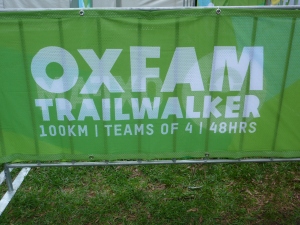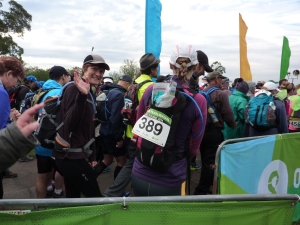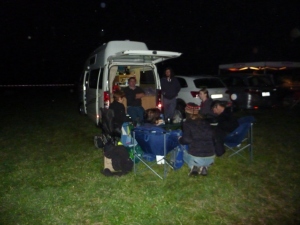How long do you think it would take you to walk 100 kilometres? Could you do it in 36 hours? 24? Less than 20? (Ultra-marathoners need not apply – you people are freaks.)
Each year, around the world, international charity organisation Oxfam gives you the opportunity to answer that question and to raise money for their work to eliminate poverty worldwide.

Oxfam Trailwalker “was established in 1981 by Brigadier Mervyn Lee in Hong Kong as a training exercise by the Queen’s Gurkha Signals, part of the Brigade of Gurkhas of the British Army, which was at the time based in the British colony. In 1986, teams of civilians were allowed to take part and Oxfam Hong Kong was invited to co-organise the event.
In 1997, with the handover of Hong Kong to China, the Gurkha regiments were relocated to the United Kingdom. The Trailwalker event followed the Gurkhas’ relocation and was organised over the South Downs in Sussex, with Oxfam in the UK acting as partner since 2002, alongside the Gurkha Welfare Trust. Oxfam Hong Kong continued to organise the original event without the Gurkhas and the event has grown with 17 events now taking place across 10 countries worldwide.” [Wikipedia]
This year, Oxfam Australia celebrated 20 years of Trailwalker, the Sydney event starting in 1999 with Melbourne not long after in 2003. A Brisbane event was established in 2011 and one in Perth in 2013 (although it was decided not to run this event this year).
Trailwalker involves a team of four completing a 100 kilometre trail within a set time. The time varies across events but ranges from 30 to 48 hours. This year the Melbourne event hosted a brand new trail and reduced the previous 48 hour cut off to 36 hours.
If this is sounding all very familiar and you’re thinking, “Hang on. Haven’t you done this event before?”, you are correct. I did the Melbourne event in 2014 (read about it here) after previously participating in 2012. Despite both times having sworn I’d never do it again (usually about 80km in at 3 o’clock in the morning when everything is aching and you think you’ll never see the sun again), I signed up again this year. Hey, it was a new trail. And being the 20th Anniversary, there was BLING!

The first challenge when you decide to take on Trailwalker is to find a team. It always made me laugh when I’d start telling someone about it and they’d sound keen until they realised it wasn’t a relay event. “No, you don’t walk 25km each. You have to walk the whole 100km.” Often I then had to move on to finding another victim candidate.
The key to selecting a team is not so much about physical fitness (although, obviously a good level of fitness is necessary) but about mental toughness. It’s a gruelling event, particularly for your mind and you need people who can push through when your body is screaming for you to stop. Obviously, given you’re going to be together for many hours, it’s a good idea if you also get along well.
For this year’s team, I managed to rope in my brother who completed the event with me in 2014 and my marathon-running friend from my 2012 team. The fourth member was a friend from work who is a bushwalker and has walked the Kokoda Trail in Papua New Guinea.

The Captains on the Trail
What is also crucial is an excellent support crew. I’ve been lucky to have two friends who have volunteered for this role for each of my Trailwalker attempts. They are the champions of support crews and I am grateful beyond suitable words for their willingness to repeatedly participate in this role.
Obviously, serious training goes into such an event. We walked increasingly longer lengths of the trail, including one memorable 47km leg on a 37°C day. The last big walk was two weeks before the event when we walked two 40km efforts, one on Saturday afternoon, the second on Sunday morning. Of course, despite the aching legs and blistered feet, who could complain about the chance to walk in beautiful settings with people you like?
This was my third crack at Trailwalker but you never stop learning. We’ve taken lessons away from each of the events I’ve completed from how a team should respond to a team member becoming very slow to never underestimating the importance of foot care. Also, nothing beats an egg and bacon roll for breakfast after walking all night. (Or egg and cheese for the vegetarians. I don’t know what vegans should do.)
This year also taught me just how much the event is a psychological challenge more than a physical one. It’s not just pushing yourself past your limits but it’s the fact you’re also trying to push three other people to the finish line. So when a team member struggles at a difficult section and you have to wait for them to push through, you need to pull on every bit of patience you can find in yourself. When a team member slows down in the later sections, you’ve got to find words of encouragement when your brain just wants to shut down. Perhaps because I’ve been the one to put the team together (and therefore designated ‘Team Leader’), I’ve felt a higher level of responsibility for everyone in the team, worrying if they’re okay, if they’re happy, talking through frustrations, willing everyone to the finish line.

Gripe: The team running in the middle finished in 15 hours. The three other teams who lined up at the front finished in 28-30 hours. And this was their target time. Why do people put themselves at the front when they know large numbers are going to have to get past them? (© Kris Smythe)
This year we had a target time of 24 hours. Having completed the 2012 and 2014 events in 26:15 and 25:35 respectively, and the new trail seeming a bit less challenging it was a target that seemed achievable.
Until things fell apart in the second section of the trail. The newbie member of the team suddenly found the going tough when we encountered the first serious hills only 12.5km into the trail. We hadn’t walked this section in training as it was a last minute change to the course due to protests from local walking groups about one of the original sections. My brother and I had walked it before as it had been part of the 2014 trail but it was new for this member. As the going got slower and slower, we could see that we were not going to remain on track. By the time we reached the checkpoint we were nearly 2 hours behind schedule.

The Lyrebird Track – such a pretty name for a most definitely unpretty hill.
This meant an adjustment to our plan and we had to shift dinner and breakfast stops. But here’s the interesting thing: in many ways the change worked out better than the original plan.
Firstly we were able to combine a warm clothes change stop and our dinner stop into one thus saving 30 minutes. Not long after we sat down under cover for dinner, the rain came pouring down. Had we been on the original plan, we’d have been out in it.

Please stop before we have to walk again. (© Kris Smythe)
Dinner was at a more convenient time for our support crew members to get to and settle into their accommodation before needing to meet us for breakfast.
The night leg is always the hardest. Many teams choose to sleep but I can’t imagine trying to get my legs to start moving again after lying down for a few hours. I’ve always found it best to just push through.
We left our support crew after dinner at 9pm and didn’t see them again until breakfast at 5.30am but they are always on call if we need them. Even if it’s just to vent via messages about another team member. (Hey, siblings are allowed to get pissed off about each other.) It’s a long and tiring leg and there may have been tears.

All you can do is watch the bobbing circle from your head torch and keep putting one foot in front of the other.
After the challenges of section 2, everyone seemed to find their walking groove overnight and we made good progress but we were still an hour and a half behind schedule by the time we stopped for breakfast one checkpoint earlier than planned. This also turned out to be for the best as it had more and closer parking than the next checkpoint.

I look remarkably perky for 5.30am and 81km, 19.5 hours completed. (© Kris Smythe)
Egg and bacon rolls were consumed, coffee was drunk, water supplies were replenished, naps were taken and feet attended to. For the first time in my Trailwalker history, I had to take painkillers.

I still had to cover 19km on this foot. (© Kris Smythe)
Every time I’ve done Trailwalker, the shift in mood after the breakfast stop is amazing. There’s something about a hot breakfast and the sun coming up that gives you new vigour and returns a smile to your face.
And it must have all worked because despite my planning including extra time for the last two sections on the assumption that we would be tired and therefore slower, we in fact did not slow down and in some miraculous way made up time. And this despite the rain coming down in earnest about 10km from the finish line.
Anyone who has completed Trailwalker will tell you that crossing that finish line is huge. It’s hard to describe the sense of achievement and relief but just check out those smiles. (© Kris Smythe)
We crossed that line (and got to the sign in tent – your finish time isn’t registered until you check in) in 24 hours and 2 minutes. It was a mysterious result given early indications but I’ll take it.

Happy Little Trailwalkers (© Kris Smythe)
Of course, it’s not just about the walk. It’s about supporting Oxfam and helping people you’ve never met. At the close of fundraising, we had raised a total of $3,428. And that’s where this is more than a team of four event or even a team and support crew event. It’s about the people around you that support, encourage and contribute to all your efforts that makes the experience all the more worthwhile. There’s something about Oxfam Trailwalker that extends beyond just an ultra-distance event. It’s knowing you’re making the world just a little bit better at the same time. That’s worth any number of blisters.
Oh, and that 3am promise that I’ll never do it again? Didn’t happen. I’ve got my sights set on becoming a Trailwalker ‘Legend’ which means I need two more events under my belt.
So. How long do you think it would take you to walk 100km?
Postscript: Someone asked me how I reconcile supporting Oxfam in light of the recent sex scandal. My response is that in a large international organisation there will always be those who do the wrong thing and in fact, in the wake of the Oxfam revelations, other aid organisations including International Red Cross, Médecins Sans Frontières, Save the Children and Plan International have been implicated in similar allegations. As this article explains better than I can, I believe that punishing an NGO by withdrawing support only ends up hurting the ones who can afford it least and risks pushing the behaviour even more underground. Providing the organisation has shown action in the wake of allegations to fix the problem, I believe they still deserve support to do the work they do that is so desperately needed around the world.



























